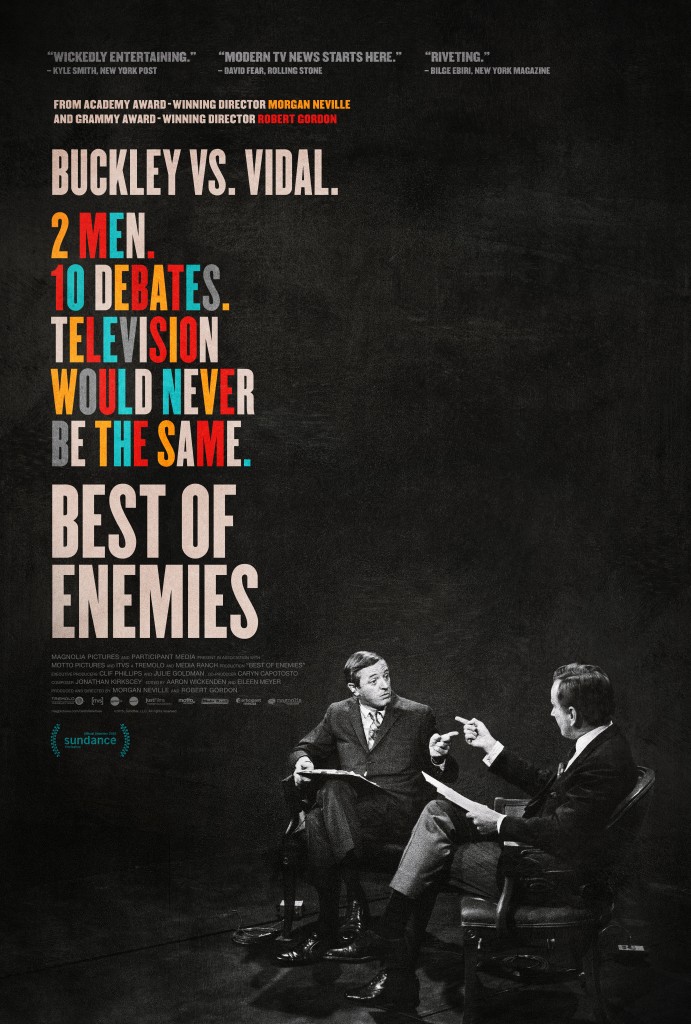By Dan Webster
This week my Faith Reels partner, Bonnie Anderson, agreed to a unilateral opinion on this documentary. It deals with a political debate carried on television news, an industry in which I spent more than 25 years.
‘Best of Enemies’ is about a series of live, nationally televised debates between two political foes who exercise great civility while at times pushing boundaries. It is brilliantly put together by Morgan Neville and Robert Gordon. The interviews of contemporaries of the two foes offer great back story and insight to drama going on in the country at the time. Just as 1968 (assassinations, racial uprisings, anti-war protests) was pivotal in our country’s modern history, so, too were these debates for American television news.
Younger viewers of this film will have no memory of the “equal time” rule or the “fairness doctrine” that broadcasters worked under. They were enforced by the Federal Communications Commission and a TV station owner could lose the license granted by the FCC to broadcast in a local community if a violation were proven.
Watching this film brought back so many memories. My first job in broadcasting was 1963 at a San Diego AM/FM/TV combo. It was owned by Time-Life Broadcasting and FCC rules then limited the number of TV stations any one company could own to seven; five VHF and two UHF. Radio/TV combo stations were grandfathered after a certain date and the FCC would not allow one company to own TV and radio stations in the same market or broadcast properties and newspapers serving the same area.
That was the climate in which the debates between William F. Buckley, Jr. and Gore Vidal took place in 1968 on network television. So for two representatives of opposing views sharing the same air time and engaging in such energetic arguments was brand new for the American TV audience.
And seeing this in the same month as the first 2015 GOP presidential debates shows how far we have not come. Buckley prophesies the conservative agenda we still hear today demonizing the poor as freeloaders, railing against labor unions, and naming big government as evil. He uses any argument to smear his liberal foe and Vidal returns the favor while positing government as the answer to societal ills, labor unions as a way to guard rights of workers, and making strong points people should be free to practice their religion as well as have freedom from religion.
Buckley’s publicly professed Christianity and his active membership in the Roman Catholic Church never reflected Catholic social teaching. But he was never a fan of Vatican II and likely would be one of the Catholics today who see Pope Francis as a socialist.
It was eerie to see how much the conservative and liberal agendas have not changed in 47 years. And it was disheartening to see how irreconcilable the two sides still appear to be. A closing video montage shows just how virulent and omnivorous the war of words has become on our TV screens. That’s due in large part to Ronald Reagan’s dismantling of the fairness doctrine and the virtual dismantling of the ownership rules for TV and radio stations. More stations, and thus editorial positions, are now controlled by fewer corporations than ever.
This documentary is a fascinating look at the media of the last century and gives a glimpse there was a time where civility on TV was possible. As fewer media companies with more and more channels seek larger audience ratings, the biggest casualty is civility.
Bonnie Anderson is a very active lay leader in her parish, diocese and in the wider Episcopal Church. She is an experienced community organizer and lives in suburban Detroit. Dan Webster is an Episcopal priest in Baltimore, Maryland and a former broadcast news executive. But don’t expect only east coast urban perspectives here. As it turns out, they both grew up in Southern California. They blog about films and faith at Faith Reels.

